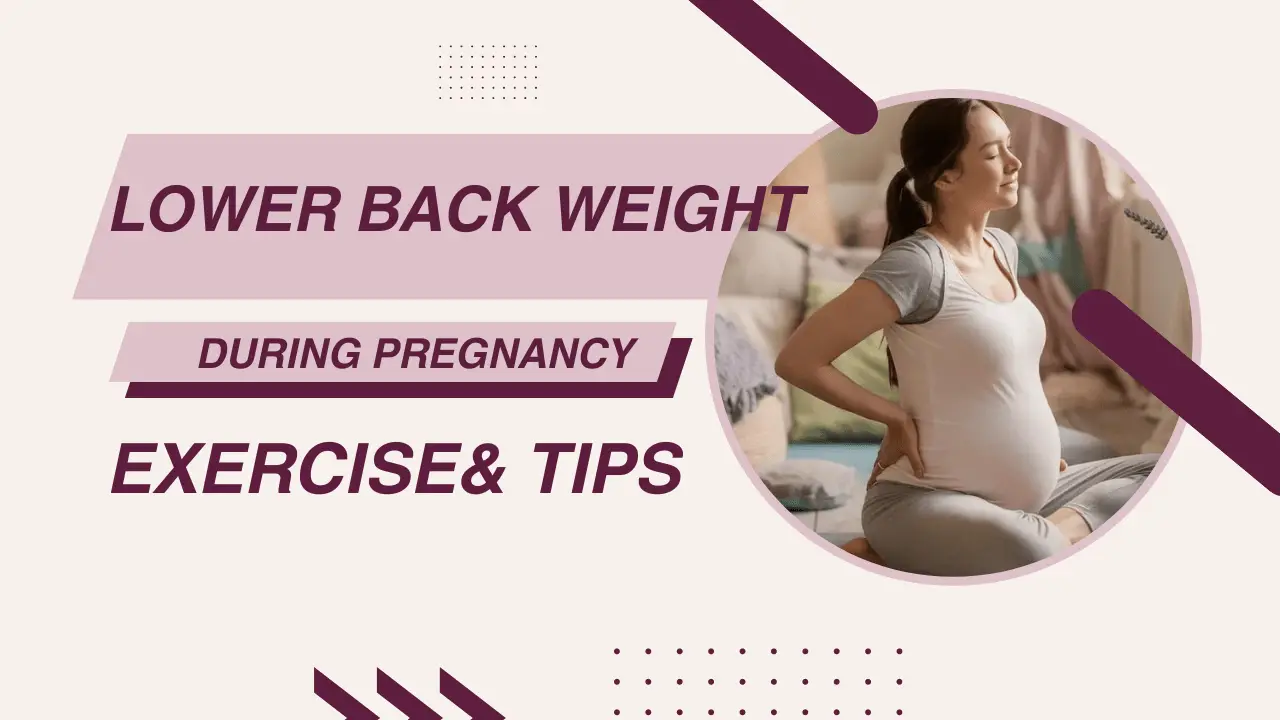Pregnancy brings about numerous changes to a woman’s body, and one common issue many expectant mothers face is lower back weight gain during pregnancy. Significant discomfort and an impact on general well-being may result from this disorder.
Weight gain frequently moves and accumulates in the lower back area as your body adapts to accommodate a growing baby, causing more strain and pain. Maintaining comfort and health during pregnancy requires knowing how to handle this component of the process.
In this blog post, we’ll look at several efficient workouts created especially to reduce weight-related lower back pain and provide helpful advice for relieving it.
You may encourage a healthier pregnancy journey and enhance your general quality of life by taking proactive measures to address these concerns.
Causes of Lower Back Weight Gain During Pregnancy:
During pregnancy, the body undergoes significant changes that can lead to lower back weight gain pregnancy, resulting in discomfort and pain. Several factors contribute to this issue:
- Hormonal Changes: As pregnancy progresses, hormones such as relaxin are released to loosen the ligaments and joints in preparation for childbirth. While this is essential for delivery, it also affects the stability of the spine and pelvis, causing the lower back to bear more weight and pressure, leading to weight gain in this area.
- Weight Distribution: The growing uterus shifts your center of gravity forward. This change in posture forces the lower back to compensate, leading to increased pressure and strain. As the baby grows, more weight accumulates in the abdominal region, exacerbating the stress on the lower back.
- Postural Shifts: To accommodate the expanding belly, many pregnant women alter their posture. This often results in an exaggerated curve in the lower back, known as lordosis. This shift increases the load on the lower back muscles, contributing to weight gain in that area.
- Increased Fluid Retention: Pregnancy often leads to fluid retention, which can cause swelling and weight gain in various parts of the body, including the lower back.
Understanding these factors is crucial for managing and mitigating the impact of lower back weight gain in pregnancy, ensuring a more comfortable and healthier experience.
Exercises to Alleviate Lower Back Pain:
Effective exercises can play a crucial role in managing lower back pain caused by lower back weight gain during pregnancy. Here’s a detailed look at some beneficial exercises:
- Pelvic Tilts: This exercise helps strengthen the lower back and abdominal muscles while improving posture. Lying on your back with your legs bent and your feet flat on the floor, execute a pelvic tilt. Tighten your abdominal muscles and push your lower back into the floor, holding for a few seconds before relaxing. Repeat several times. This helps counteract the weight gain and reduces strain on the lower back.
- Cat-Cow Stretch: This gentle stretch improves flexibility and relieves tension in the back. Place yourself on your hands and knees like you’re on a table. Take a breath, raise your head and tailbone, and arch your back (cow pose). Exhale, round your back (cat position), and tuck your chin to your chest. Repeat this flow to enhance spine mobility and reduce lower back discomfort.
- Side-Lying Leg Lifts: Strengthening the hip and core muscles can alleviate pressure on the lower back. Lie on your side with your legs straight. Slowly lift the top leg while keeping it straight, then lower it back down. Perform several repetitions on each side. This exercise helps support the lower back by strengthening the muscles around it.
- Prenatal Yoga Poses: Gentle yoga poses, such as a child’s pose and downward-facing dog, can stretch and strengthen the back while providing relaxation. Incorporating these poses into your routine can help manage the discomfort associated with lower back weight gain during pregnancy.

These exercises, combined with proper posture and body mechanics, can significantly reduce lower back pain and enhance overall comfort during pregnancy.
Tips for Relieving Lower Back Discomfort:
Relieving lower back discomfort caused by lower back weight gain during pregnancy involves a combination of practical strategies and lifestyle adjustments. Here are some effective tips:

- Maintain Good Posture: Proper posture is crucial for alleviating lower back pain. Aim to keep your shoulders back and your spine aligned. When sitting, use a chair with good lumbar support or place a cushion behind your lower back to support its natural curve. Standing with your weight evenly distributed between both feet can also reduce strain on your lower back.
- Use Proper Body Mechanics: When lifting objects, bend at the knees rather than the waist, and keep the object close to your body. Avoid twisting while lifting to prevent additional strain on your back. This is particularly important during pregnancy, as improper lifting can exacerbate lower back weight gain pregnancy issues.
- Apply Heat or Cold: Using a heating pad or warm compress on the lower back can help relax tense muscles and increase blood flow. Conversely, applying an ice pack can reduce inflammation and numb sharp pain. Alternate between heat and cold applications based on what provides the most relief.
- Wear Supportive Footwear: High heels or unsupportive shoes can exacerbate back pain. Opt for comfortable, supportive footwear with good arch support to maintain proper alignment and reduce stress on the lower back.
- Stay Active and Stretch: Regular, low-impact exercises like walking and swimming can improve overall muscle strength and flexibility. Incorporate stretching routines, focusing on the lower back, hips, and legs, to alleviate tension and maintain mobility.
By integrating these tips into your daily routine, you can effectively manage lower back discomfort associated with lower back weight gain during pregnancy and improve overall comfort.
Additional Tips for Managing Weight Gain:
Managing weight gain effectively during pregnancy, especially related to lower back weight gain pregnancy, involves adopting a balanced approach to diet, exercise, and lifestyle. Here are some additional tips:

- Adopt a Balanced Diet: Focus on a nutrient-dense diet that supports both your health and the baby’s development. Include a range of healthful grains, fruits, vegetables, lean meats, and healthy fats. Avoid excessive consumption of high-calorie, low-nutrient foods. Proper nutrition helps manage weight gain and can alleviate the impact of lower back weight gain during pregnancy.
- Monitor Portion Sizes: Keeping track of portion sizes can help prevent excessive weight gain. Eating smaller, more frequent meals can help manage hunger and avoid overeating. Avoid eating out of boredom or stress by paying attention to your body’s hunger cues.
- Stay Hydrated: Drinking plenty of water throughout the day aids in digestion, reduces bloating, and supports overall bodily functions. Proper hydration can also help manage weight and reduce discomfort associated with lower back weight gain during pregnancy.
- Engage in Regular Exercise: Incorporate safe, moderate-intensity exercises into your routine. Activities like walking, swimming, and prenatal yoga can help control weight gain, strengthen core muscles, and reduce lower back strain.
- Track Weight Gain Progress: Regularly monitoring your weight gain can help you stay on track with recommended guidelines. Keep a record of your progress and discuss any concerns with your healthcare provider to ensure that your weight gain remains within a healthy range.
By following these tips, you can better manage weight gain during pregnancy and mitigate issues related to lower back weight gain pregnancy, promoting a healthier and more comfortable pregnancy experience.
Conclusion:
Controlling weight growth in the lower back A mix of focused exercise, good posture, and lifestyle modifications is useful throughout pregnancy. It is possible to reduce pain and enhance general well-being by including targeted back workouts and using useful techniques for pain relief.
A balanced diet, drinking enough of water, and getting regular exercise will also help you control your weight increase and feel more comfortable throughout your pregnancy. Give these tactics top priority to guarantee a more comfortable and healthy pregnancy experience. Click to learn more.
FAQs:
- What causes lower back weight gain during pregnancy?
- Hormonal changes, shifting weight distribution, and altered posture due to a growing belly can contribute to lower back weight gain during pregnancy.
- How can exercises help with lower back weight gain pregnancy?
- Exercises strengthen core and back muscles, improve posture, and reduce strain on the lower back, helping to alleviate discomfort caused by weight gain.
- Are there specific exercises recommended for lower back pain in pregnancy?
- Yes, pelvic tilts, cat-cow stretches, and side-lying leg lifts are beneficial exercises for relieving lower back pain and managing weight gain during pregnancy.
- What are some tips for relieving lower back discomfort during pregnancy?
- Maintain good posture, use proper body mechanics, apply heat or cold, wear supportive footwear, and stay active with regular stretching.
- How can I manage weight gain to reduce lower back pain?
- Focus on a balanced diet, monitor portion sizes, stay hydrated, engage in regular exercise, and track weight gain progress to manage weight effectively and reduce lower back pain.
